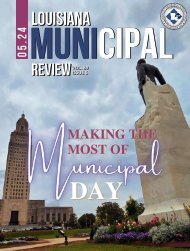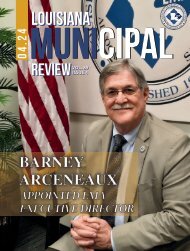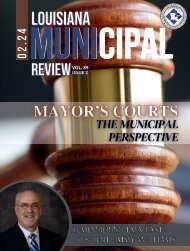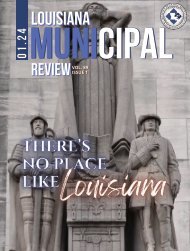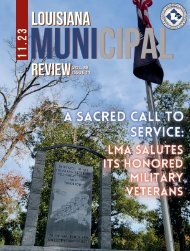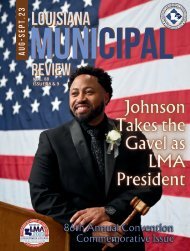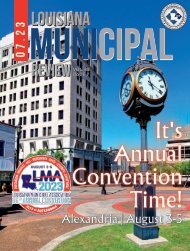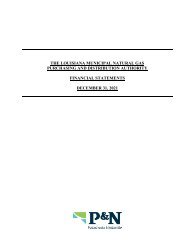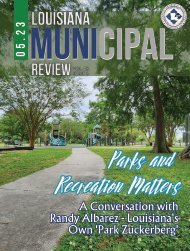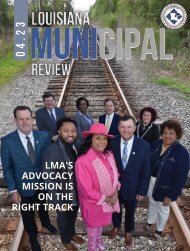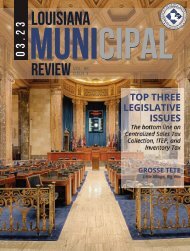LMR April 2021
You also want an ePaper? Increase the reach of your titles
YUMPU automatically turns print PDFs into web optimized ePapers that Google loves.
LOUISIANA
MUNICIPAL REVIEW
Published by the Louisiana Municipal Association
VOL. 86, ISSUE 4
APRIL 2021
Legislative Advocacy
Takes
Includes:
Turning Trials to
Triumphs, Part II
BROWNFIELD
ASSESSMENT
LET LAMATS
CONDUCT A
SITE VISIT &
GIVE YOUR
COMMUNITY A
CLEAR PATH
FORWARD.
CALL TODAY
(225) 344-5001
The Louisiana Municipal Review, the official publication of the Louisiana Municipal Association, serves as a medium for the exchange
of ideas and information for municipal officials in Louisiana. With a circulation of over 3,200, this publication is read by employees of
Louisiana municipal governments, sheriffs, parish presidents, state government officials, and members of the state legislature and
Congressional delegation, among others. Subscription rate: $24 per year; Single copy: $2. Louisiana residents,add 9% sales tax.
Rates for display, professional-listing, and classified advertising available upon request at editor@lma.org.
Statements or expressions of opinions appearing herein are those of the authors and not necessarily those of the Louisiana
Municipal Association. Publication of any advertisement shall not be considered an endorsement of the product or service involved.
No material from this publication may be reprinted without the express permission of the editor.
Editorial offices: Louisiana Municipal Association, 700 North 10th Street, Suite 400, Post Office Box 4327, Baton Rouge, LA 70821 -
4327, editor@lma.org, www.lma.org, (225) 344-5001, (800) 234-8274, FAX (225) 344-3057.
LOUISIANA MUNICIPAL REVIEW
MUNICIPAL REVIEW STAFF
(USPS 832-560) (ISSN 0164-3622)
Editor-in-Chief: John Gallagher jgallagher@lma.org
3 rd class postage paid at
Managing Editor: Karen Day White kwhite@lma.org
Baton Rouge, Louisiana.
Postmaster – Send address changes to:
Editor: Anita Tillman atillman@lma.org
LOUISIANA MUNICIPAL REVIEW
Production Coordinator: Baton Rouge Press, Inc.
Post Office Box 4327
Baton Rouge, LA 70821-4327
2020-2021 LMA EXECUTIVE BOARD (non-affiliate, non-advisory)
President – Jimmy Williams – Mayor, Sibley
District J Vice President – Rodney Grogan, Mayor, Patterson
First Vice President – Michael Chauffe – Mayor, Grosse Tete LMA Past President – Barney Arceneaux, Mayor, Gonzales
Second Vice President– Jennifer Vidrine – Mayor, Ville Platte LMA Past President – Johnny Berthelot, Councilman, Gonzales
Immediate Past President – Harry Lewis – Mayor, Rayville
LMA Past President – Glenn Brasseaux, Mayor, Carencro
District A Vice President – Peggy Adkins, Mayor, Sarepta
LMA Past President – David Butler, Mayor, Woodworth
District B Vice President – Ronny Walker, Mayor, Ruston
LMA Past President – David Camardelle, Mayor, Grand Isle
District C Vice President – Adam Holland, Mayor, Oak Grove LMA Past President – Clarence Fields, Mayor, Pineville
District D Vice President – Rick Allen, Mayor, Leesville
Vice President at Large – Mark Piazza, Mayor, Abbeville
,
District E Vice President – Nathan Martin, Councilman, Pineville Vice President at Large – Darnell Waites, Mayor, Baker
District F Vice President – Charles James, Mayor, Sunset
Vice President (< 1K) – Kevin Colligan, Mayor, Cankton
District G Vice President – Kenneth Stinson, Mayor, Vinton
Vice President (1K – 2.5K) – Randal Rodgers, Mayor, Stonewall
District H Vice President – David Toups, Mayor, Addis
Vice President (2.5K – 5K) – Robert Hardey, Mayor, Westlake
District I Vice President – Jean.Pelloat,.Mayor,.Madisonville
Page 2
LMR | APRIL 2021
Inside the LMA
Director’s Viewpoint
HEADED IN THE RIGHT DIRECTION
BY JOHN GALLAGHER, EXECUTIVE DIRECTOR
When President Biden signed the
American Rescue Plan into law
on March 11, it marked an historic
moment for local governments in
their ongoing recovery from the COVID-19 pandemic.
For the first time in the history of the United States, a
congressional act provides direct federal funding to all
19,000 municipal governments in our country. The State of
Louisiana and our municipalities and parishes are slated to
receive some $4.9 billion of the $1.9 trillion in aid from this
stimulus package. Many of you have seen estimates of the
funding that you will receive, and they are considerable.
While we await guidance from the U.S. Department of
Treasury on how these funds may be used, I encourage
you to brainstorm now to plan what I like to call “legacy
projects,” which will ensure that future generations will
enjoy strong infrastructure and thriving communities. A
few examples of legacy projects are improving water
and sewer infrastructure, developing and expanding
broadband, and partnering with local nonprofit
organizations to address homelessness, lift families out
of poverty, and support small businesses.
More information on the ARP may be found in the Legal
Briefs article in this issue and on the COVID-19 page of
our website. I want to express my appreciation to the
staff of the National League of Cities (NLC) who worked
tirelessly for almost a year to make the ARP a reality. The
LMA joined the 48 other municipal leagues and many of
our municipal leaders in collaborating with the NLC in
this endeavor. Your membership in NLC is what funds
these critical advocacy efforts and it pays dividends. If
you are a member of NLC, thank you; if you are not, I
encourage you to join NLC to support the important work
of advancing local government interests on Capitol Hill.
The LMA Legislative Advocacy team is gearing up for
the April 12 opening of the 2021 Regular Session of
the Louisiana Legislature. This 60-day “fiscal only”
session will focus on issues of great importance to local
governments. HB 199, a constitutional amendment
seeking to streamline sales tax collection while preserving
local authority and control will top the list. We expect
various bills that attempt to alter or repeal the inventory
tax and the current Industrial Tax Exemption Program
(ITEP). I urge you to read our feature article this month
and to keep up with legislative happenings through our
weekly legislative reports. Our urgent requests and calls
to action are sent by email, so I also urge you to assign
a staff member to monitor
your email accounts for such
activity. Grassroots advocacy by
our municipal officials is an essential
component of our success at the capitol.
So, in every call to action, our team not only describes the
issue and our position, but also equips you with talking
points for your conversations with your legislators.
I have been hearing from members throughout the state
that they are ready to begin transitioning back to inperson
gatherings. I know that it has been a long year of
video meetings, webinar events, and phone conferences.
With guidance from our Executive Board, we will begin
providing in-person educational opportunities in a safe
and responsible manner, as the threat of COVID-19 persists.
We will host a Crawfish Boil on May 5 in Baton Rouge to
commemorate a scaled-down 2021 Municipal Day. While
we will not provide transportation to the capitol because
of current restrictions, we will provide legislative briefing
materials and encourage you to visit with your legislators
at the capitol while you are in town. Please join us to enjoy
crawfish with all the trimmings while networking with
your peers and legislators. The LMA District meetings
will be held in person throughout the month of June. Our
District Vice Presidents are diligently working with our
staff to provide larger meeting areas that accommodate
social distancing, while also ensuring all essential safety
protocols for food and beverage service. Lastly, we are
moving forward with planning our 2021 LMA Annual
Convention, which is scheduled for July 29-31 in Baton
Rouge. We are working closely with Mayor Broome’s
staff to determine the appropriate parameters to operate
within. We are hopeful that our convention will include
all of the usual components that we enjoy, and we are
dedicated to doing as much as possible to safely make
that a reality. Please save the date and plan on joining us
for this pinnacle event.
More information on all of our events may be found
on our website, in our weekly e-newsletter, and in our
monthly magazine.
Thank you all again for the exceptional leadership you
have shown throughout this past year. Though the battle
against COVID-19 continues, thanks to your efforts, it
appears that the numbers are beginning to decrease.
We join every Louisiana citizen in hoping that our
governments and businesses will be fully open for the
summer!
LMR | APRIL 2021 Page 3
President’s Message
ADVOCACY WORKS!
BY MAYOR JIMMY WILLIAMS, TOWN OF SIBLEY
Daylight Savings Time, pollen everywhere,
green tree foliage, and 7:30
sunsets let me know one thing for
sure: change is inevitable. March 20,
2021 marked the first day of Spring.
We’ve been around long enough to know that it’s nice to
have a date to expect things to take place, but most of the
time life doesn’t work in lock step with our clocks and calendars.
The change of seasons happens when the season changes.
As we look toward the upcoming 2021 Regular Session, this
issue of the Louisiana Municipal Review focuses on LMA’s mission
of legislative advocacy. The American Rescue Plan (ARP)
is an incredible example of the power of our unified voices.
In 2020, local government’s pleas for direct funding were
mocked and vilified for months, but LMA and our members,
along with national advocates like the National League of
Cities, stood firm and kept up the fight.
LMA is strongest when we are working together towards
a common goal. The wind was knocked out of us when
the legislature reallocated millions of federal dollars that
were earmarked for local government last year. The cost of
responding to the public health emergency compounded by
multiple hurricanes threatened to leave many of our cities,
towns, and villages in dire financial straits without direct
aid from the federal government. We used every possible
avenue to lobby Congress and while it seemed to fall on deaf
ears, we didn’t give up. Then, the season changed.
What felt like cold winter nights of being shut out of relief
efforts, has finally shifted to a brighter, spring day. Today, we
are thankful that local government in Louisiana can look forward
to over $1.7 billion in direct funding to aid in recovering
from the devastating effects of last year. We can continue to
provide essential services in our communities. Capital expenditures
and infrastructure projects can move forward. We can
invest in community and economic development programs.
Municipal governments can now expedite the reopening of
local businesses by shoring up our capacity for code inspections,
planning, and permitting.
We will certainly be called to harness our collective voices
this session along with the LMA Legislative Team. When the
Call to Action goes out, please make it a top priority to get
engaged and take action. Advocacy works! The impact of
our efforts may not always be felt instantly, but we must remain
convinced that when we speak with one voice, change
is inevitable.
Notice to Those Seeking LMA Office
In accordance with Article 3 of the Constitution of the
Louisiana Municipal Association, we give the following
notice:
All individuals who intend to run for Executive Office
(President, First Vice President, and Second Vice President)
of the LMA must provide a written Letter of Notification
to the LMA Executive Director by May 1 of the year in
which they are running (must be postmarked by May 1).
Published reminders of “Notice of Office Seeking” with the
specified May 1 qualifying date will be broadcast to the
LMA membership via three sources: email, the Louisiana
Municipal Review, and also by general mailout beginning
in March/April of each year. A copy of each qualifying
letter received will be published within the July issue of
the Louisiana Municipal Review. All said individuals are
strongly encouraged to attend at least 7 of the 10 LMA
District Meetings in that year. Any individual who will not be
attending any specific LMA District Meeting is asked to place
a courtesy call to the LMA President and hosting District Vice
President in order to allow for appropriate accommodations
at that meeting. After May 1, no nominations from the floor
will be allowed at the Annual Business Meeting except under
extreme circumstances and specific criteria including but not
limited to: Death, Resignation, Non-Reelection, Health Issues,
Vacancy in Office Legal Matters: Pending Indictments, On-
Going Investigations, Criminal Activity In the event an officer
or candidate should find themselves or be found to be in a
questionable position regarding their eligibility as the Annual
Convention approaches, the LMA Active Past Presidents will
approach said officer or candidate to discuss their situation.
The LMA Active Past Presidents shall then report to the LMA
Executive Board at its meeting at the Annual Convention
(prior to the Annual Business Meeting) if nominations from
the floor will be opened or not for that given year. If more
than two individuals run for a position and one does not
receive more than 50 percent of the vote for that office, then
there shall be a run-off between the two top candidates with
the most votes. Details: If you have additional questions,
please contact the LMA staff at (225) 344-5001.
Page 4
LMR | APRIL 2021
Inside the LMA
Governor’s Column
WORKING TOGETHER TO GET BACK TO NORMAL
BY JOHN BEL EDWARDS, GOVERNOR OF LOUISIANA
Spring is in the air, and this is the time of
year when we look forward to enjoying
the great outdoors and all the bounty
that Louisiana has to offer. We’re blessed
to live in such a beautiful state filled
with incredible people, food and culture. As we prepare for
the upcoming legislative session, there is some good news
to report as our state and nation continue to fight COVID-19.
We have made tremendous progress which could not have
happened without all of us pulling together, and for that, I’m
grateful. At the same time, let us not forget that we have lost
more than 10,000 of our brothers and sisters to this virus. And
while we are seeing progress statewide, there are nearly 200
cases of the U.K variant throughout our state which we know
can be more serious, and there are still some regions where
cases and hospitalizations are plateauing and increasing.
That should compel everyone to keep doing all that we can
to protect each other, our families and communities. The
good news is that everyone ages 16 and older can now get
one of the three safe and effective vaccines without having a
medical condition or working in a certain occupation. We get
to determine how soon we bring Louisiana back.
On that note, the Louisiana Department of Health has
launched the Bring Back Louisiana grassroots campaign to
help increase vaccinations in communities statewide. They are
our best way to put this pandemic behind us. In just a short
time, more than 300 volunteers have signed up to help make
phone calls, knock on doors and so much more. We welcome
your help in encouraging all of your constituents to join us by
visiting lava.dhh.Louisiana.gov. To date, we have administered
over 1 million first shots and more than 600,000 people have
been fully vaccinated. Let’s keep it going.
Looking ahead to the legislative session, my budget proposal,
is balanced without any need for cuts. It includes: a pay raise
for K-12 teachers and support staff; an historic increase in
Go Grants; additional Higher Education funding including a
faculty pay increase; and full funding for senior centers and
Councils on Aging. I want to see everyone in Louisiana thrive
and have fair access to opportunity. Despite the tough year we
have faced, Moody’s Credit Rating Agency has upgraded our
credit rating from stable to positive. The Revenue Estimating
Conference has improved our revenue forecast, and we have
benefited from federal CARES funds and an increase in the
Medicaid Federal Medical Assistance Percentage, or FMAP. All
of this has allowed us to present a responsible budget while
maintaining critical services and programs.
Under the American Rescue Plan (ARP), Louisiana has been
allocated $3 billion, which must be spent by December 2024.
We are proposing holding back a significant amount for future
uses. This time around there are funds available to state and local
governments. There are 12 metropolitan cities in line to receive
$572 million, which will go directly to them. Smaller cities,
towns and villages, around 292 from Abbeville to Zwolle, will
share some $320 million which will be distributed by the state.
However, it is important to note that we are still waiting on both
the funds and the guidance on how those dollars can be spent.
When it comes to broadband, there is an additional $180M
in the ARP that will be coordinated by our newly established
office of Broadband Development and Connectivity. Among
other things, the current pandemic has put a spotlight on the
need to increase connectivity throughout our state and make
it affordable – especially in the rural areas. Veneeth Iyengar
will serve as the first executive director of that office and will
lead the state’s efforts in addressing the challenges around
broadband. As Veneeth has said, “This is vital to our economic
development as it encompasses nearly all sectors from
agriculture to health care.” He previously served as assistant
chief administrative officer for Baton Rouge Mayor-President
Sharon Weston Broome. He has a wealth of knowledge and
experience, and I am excited to have him join our team. He is
looking forward to connecting with the LMA in the near future.
Soon, the federal government will make approximately $7
billion available to addresses the inadequate broadband
coverage across the country. We will be working closely
with our federal partners to understand where the greatest
need exists. In the next few weeks, I will be joining the
Delta Regional Authority in announcing an exciting new
initiative designed to identify broadband accessibility in
Louisiana. However, it will only be successful if you participate.
With your help, we can make smart investments to help close
the broadband gap, making the state a more viable option for
businesses and for people to work and live.
Easter is something I know many of you looked forward to
celebrating, and this year those who have been vaccinated
were able to gather together in small groups. Just last month,
I was able to hug and share a meal with my mother for the first
time in a year so I know how much that means. The vaccines
made that possible for me, and they are doing the same for
other families. I also know there are still many questions
about them, and I cannot stress enough how important it
is to encourage or facilitate conversations between your
constituents and doctors or other trusted health care workers
who have been our heroes throughout this public health
emergency. Continue to take care of yourselves, and let’s keep
working together to get back to normal. God bless you, your
families and all of the wonderful people in your communities.
LMR | APRIL 2021 Page 5
Legal Briefs
THE DATA BEHIND THE AMERICAN RESCUE PLAN
BY KAREN DAY WHITE, EXECUTIVE COUNSEL
It is certainly the biggest news for local
governments this year. The American
Rescue Plan that was signed into law
on March 11 touts direct and flexible
funding for the Thornton, over 19,000 Musso, cities, &Bellemin town, and villages
nationwide. The $1.9 trillion relief package includes a
collective $350 I approve billion this for ad state copy for and use local in the following governments. issues:
Louisiana’s local governments have been on the front lines
addressing the pandemic for over a year and have weathered
numerous devastating natural disasters to boot. For months,
the LMA has joined our state and federal partners in advocating
for both short and long-term funding as being critical to the
success and recovery of Louisiana’s citizens. Our members
provide the essential Index Listings services that citizens rely on daily –
including utilities, transportation, police and fire protection,
WATER TREATMENT CONSULTANTS
and more. So, the interruption in revenue and increased
expenditures brought on by the disasters of 2020 have
threatened to cripple our community infrastructures and the
fundamental well-being of Louisiana residents.
The Louisiana Legislative Auditor’s Office has estimated that
for FY20/FY21, Louisiana’s local governments will lose an
estimated $715 million in revenue, and that figure does not
include the loss of critical self-generated revenue from traffic
enforcement, license fees, and other fines. A survey of our local
governments revealed that 9 out of 10 were forced to make
significant cuts to their budgets.
Since the pandemic began, more
than 433,785 Louisiana citizens have
been infected with COVID-19 and
more than 9,748 people have died.
The unemployment rate is 7.9%,
up from 5.2% before the pandemic,
and since February of 2020, over
109,879 people have been become
unemployed. Whether directly or
indirectly, forced municipal budget
reductions have unfortunately
contributed to this sad statistic.
Approximately 440,000 adults – 16%
of all adults in the state – report not
having enough food to eat, including
164,000 adults living with children.
An estimated 207,000 renters (23%
of renters) are still not caught up on
rent, while 45% of adults statewide
report having difficulty covering
normal household expenses.
Membership Directory
2018 Roster Edition
Official Publication of the
Louisiana Rural Water Association
Pub Code
By investing in Louisiana’s local governments, as well
as individuals, the ARP will shore up the governmental
infrastructure that empowers our communities to thrive. The
stimulus package is designed to provide $3.132 billion in state
fiscal relief and $1.777 billion in local fiscal relief in Louisiana,
along with over $2.653 billion in relief for K-12 schools. Funding
LWR-R0018
breakdowns for both municipal and parish governments may
Authorized Signature:
be accessed from our COVID-19 page on our website.
The plan also provides for Date: individual stimulus payments of
up to $1,400 for more than 2,861,000 adults and 1,334,100
Artwork Contact:
children, representing 91% of all adults in the state and 93%
of all children in the state. The additional relief of up to $1,600
per child through the Child Tax Credit is estimated to go to
the families of 1,028,000 children, lifting 94,000 children out of
poverty status. For 298,000 childless workers, including many
frontline workers, the plan provides additional relief of up to
nearly $1,000 through the Earned Income Tax Credit.
The massive scale of this relief package means that the
rules developed by the U.S. Department of Treasury for
implementation and administration are critical. As soon as
that information is available, we will broadcast it far and wide
through emails, our weekly e-newsletter, and our social media
platforms, so please make sure that we have your preferred
email addresses in to receive these important updates.
Custom Water
Treatment Programs
Designed by Professionals Since 1990
POTAB
ABLE
WASTE
WA
ATER
FAX: (225)654-9533
P. O. Bory,
Advertising Space
LWR-R00
Ad Order # 1636839
Adv Code 179697
S. Rep: Jason Zawada (C)
Corrosion Inhibition Iron & Manganese Control Enhanced Disinfection NSF Certified
EPA Approved Chlorine dioxide for Stage 2 compliance assurance DBP reduction
Sludge Dewatering Polymers Dechlorination Technical Support/Service Testing
Naylor, LLC - Gain
5950 NW 1st Pl
Gainesville, Florida,
Tel:(800) 369-6220, (352
Fax: (352) 331-3
Page 6
707693_Thornton.indd 1
LMR | APRIL 2021
8/21/14 8:33 PM
Inside the LMA
Technical Assistance Announcement
Due to the 2021 Regular Session, the LMA legislative team
will be largely out of the office April 12 through June 10.
They will be at the Capitol focusing on the issues that affect
municipal government, and zealously advocating on behalf
of our members. Unfortunately, this means that they will not
be readily accessible by telephone to respond to requests for
technical assistance on a daily basis.
The LMA encourages you to consult with your municipal
attorney in the event of such a need. The LMA works closely
with the Louisiana City Attorney’s Association to provide continuing
education regarding matters pertaining to municipal
government. Furthermore, there is an abundance of resources
available on our website under “Publications,” including information
on the Lawrason Act, public records, open meetings,
mayor’s court, public bid law, annexation, and dual office-holding,
among other topics. You are encouraged to review that
information for assistance with any issues that you encounter.
Otherwise, please email any technical assistance questions to
John Gallagher (jgallagher@lma.org), Karen White (kwhite@
lma.org), or Brandon Brewer (bbrewer@lma.org). We will do
our best to respond to any such written inquiries in a timely
fashion. We appreciate your understanding and accommodation
during this hectic time.
As the legislative team fights to protect municipal interests
and coffers, we will keep you apprised of any relevant developments
and will reach out for your assistance when needed
through email and One Call initiatives.
ENVIRONMENTAL
TECHNICAL SALES, INC.
7731 Office Park Blvd.
Baton Rouge, LA 70809
(225) 295-1200 (225) 295-1800 (fax)
Daniel Hebert, President
Ronnie Hebert, Chairman
Brady Sessums, Vice President
www.etec-sales.com
Water … Wastewater … Sludge
Odor Control…Pumping
Equipment Systems…Solutions
LMR | APRIL 2021 Page 7
- REGISTRATION FORM-
Louisiana Municipal Association
4 4 th Annual Municipal Day Crawfish Boil
Wednesday, May 5, 2021
Drusilla Place Catering
3482 Drusilla Lane, Baton Rouge, LA 70809
NAME
BADGE NAME
TITLE
MUNICIPALITY
ADDRESS
(STREET OR P.O. BOX) (CITY) (STATE) (ZIP CODE)
TELEPHONE ( ) FAX ( )
GUEST NAME
DELEGATE CRAWFISH BOIL FEE: $30 per delegate, elected/appointed
official or municipal employee
GUEST CRAWFISH BOIL FEE: $30 per guest of delegate
NON-MEMBER CRAWFISH BOIL FEE: $50 per non-municipal participant
DISCLAIMER:
In registering for and attending this event, I agree to abide by state and local
health mandates as well as any rules put in place by the Louisiana Municipal
Association or event venues. I understand that by attending this event in person,
it is possible that I may be exposed to coronavirus and I hereby assume that risk.
YES, I AGREE
NO, I DO NOT AGREE
ACCOMMODATIONS:
A block of rooms has been reserved at the Crowne Plaza Hotel at a rate of $114.95
Single/Double. Please call (225) 925- 2244 to make your reservations and mention
that you are with Louisiana Municipal Association’s Municipal Day to secure this
special rate. The group code for reservations is ‘LMA’. Hotel check- in time is
4:00 p.m. and check- out is 11:00 a.m. unless special arrangements are made in
advance.
REFUND POLICY:
Registration fees are non-refundable. An administrative fee of $10 per
registration will be charged for all cancellations, including medical emergencies.
No refunds will be given after April 21 (two weeks prior to the start of the event).
Refunds will be issued only if the LMA office receives your cancellation request
in the form of a letter on your official letterhead mailed, emailed, faxed, or
delivered to our office with a postmark date no later than April 21. Telephone
requests for refunds are not accepted. There will be no exceptions to this policy.
Complete this form and return with
your registration fee payment in full,
no later than April 21, 2021 .
Registration forms sent without
payment in full will not be
accepted.
MAKE CHECKS PAYABLE TO:
Louisiana Municipal Association
Municipal Day
P.O. Box 4327
Baton Rouge, LA 70821
REGISTER ONLINE:
WWW.LMA.ORG
HAVE A QUESTION?
Contact: Nikki Samrow, P.O. Box 4327, Baton Rouge, LA 70821, (225) 344- 5001 Phone, (225) 344- 3057 Fax, nsamrow@lma.org
Page 8
LMR | APRIL 2021
Feature
Legislative Advocacy Takes Center Stage
The word “lobbyist” carries a negative connotation
these days, and a glance at lobbyist
spending and outcomes demonstrates why.
On Capitol Hill, nearly 12,000 lobbyists spend
over $3 billion per year to influence congressional
and executive leaders; and at the Capitol
in Baton Rouge, Louisiana lobbyists spend
around half a million each year. It is no wonder
that Will Rogers famously quipped, “Lobbyists
have more offices in the Washington than the
President. You see, the President only tells
Congress what they should do. Lobbyists tell
‘em what they will do.”
Local government advocates do not have the
luxury of exorbitant spending due to practical,
fiscal, and ethical constraints. Instead, those of
us who fight for municipal government autonomy,
authority, and funding must work harder
and smarter. We harness technology, seek
creative advocacy partners, and, most importantly,
secure the legislative engagement of
our municipal leaders. In a legislative world of
spending Goliaths, we Davids must aim carefully
and use our pebbles strategically.
Years ago, an odd-year, fiscal-only legislative
session may have been a largely technical endeavor
resulting in a quiet advocacy year for
local governments. Welcome to 2021 - strap
on your safety belts.
Our well-articulated mantras have not
changed: all politics is local, restoring local
control should be a bipartisan goal, and locals
know best how to run their affairs and tailor
solutions for their issues. What makes this year
different from those of recent memory are the
varied but coordinated attempts by legislative
leaders to reform Louisiana’s tax system
to purportedly make Louisiana more business
friendly.
Just the Facts
Before we talk about what legislative efforts
will attempt to do regarding tax reform this
year, it is important to address what legislators
are not doing along those lines.
There are currently over 200 tax exemptions
and exclusions scattered in our law and constitution.
Some of these exemptions and exclusions
are mandatory for local governments,
and some local governments may opt into;
LMR | APRIL 2021 Page 9
some only apply to the state and some only apply to local
governments. Louisiana undoubtedly has one of the most
convoluted sales tax systems in the country, yet even as some
legislators bemoan the complexity of the system, they continue
to introduce legislation to create even more specialized
tax exemptions for particular industries or circumstances.
These exemptions are estimated to cost local governments
over $1.3 billion in lost tax revenue per year, and the latest
Louisiana Tax Exemption Budget estimates that these exemptions
cost state government over $6.6 billion per year, resulting
in a collective annual revenue loss of around $8 billion
per year.
By now, you have heard about attempts to streamline sales
tax collection through a single online portal (discussed further
below). Many advocates of the concept assert that doing
so will significantly improve Louisiana’s tax friendliness and
thus our scores with national groups such as the Council on
State Taxation and the Tax Foundation. But until the Louisiana
legislature rolls up its sleeves, deals with these hundreds
of sales tax exemptions and exclusions, and brings uniformity
to Louisiana’s complicated tax system, the needle will move
very little in the realm of our sales tax standing.
To demonstrate the point, on October 28, 2015, then Director
of State Projects for the Tax Foundation, Scott Drenkard,
testified before the Sales Tax Streamlining and Modernization
Commission. Mr. Drenkard testified under oath that the administration
of Louisiana state and local sales taxes does not
form any part of the Tax Foundation’s formulary for deriving
our state score and ranking. Further, when asked directly if
centralizing our divergent state and local sales tax collection
would improve our score in any way, Mr. Drenkard unequivocally
responded, “No.”
You may also hear legislators assert that centralizing sales tax
administration is going to result in a financial reward as Louisiana
becomes
“Wayfair-compliant,”
enabling Louisiana
to collect
internet sales taxes.
That demands
clarification.
On June 21, 2018,
the US Supreme
Court issued their
decision in South
Dakota v. Wayfair,
Inc., effectively
allowing for collection
of internet
sales taxes from
dealers without a
physical presence
in the state. In finding South Dakota’s tax scheme to be constitutional,
SCOTUS relied heavily on the fact that the state
had adopted the Streamlined Sales and Use Tax Agreement
(or SSUTA). One of the core demands of the SSUTA is that the
state must have uniform state and local tax bases, along with
simplified rates. Louisiana has not adopted the SSUTA, and
not only are there no current legislative attempts to simplify
Louisiana’s sales tax system, but there are currently a dozen
proposed bills this session that would create additional sales
tax exemptions, complicating the system even further.
Despite this complexity, the Louisiana Sales and Use Tax Commission
for Remote Sellers (“Remote Sellers Commission”), a
local government-driven creation, has been busy checking
as many Wayfair boxes as possible. The Remote Sellers Commission
has tackled the difficult job of creating a matrix that
geo-maps all taxing authorities, assigning the exact tax rates
with exemptions/exclusions layered thereon at the points of
sale for remote purchases, making taxpayer reporting and remittance
a simple proposition. Their online portal launched
in earnest on July 1, 2020. Since then, the Commission has
collected around $180 million in internet sales taxes, and
registration and compliance continue to build each month.
While one may speculate why attempts to simplify Louisiana’s
sales tax system are not part of this session’s efforts, it is a historical
fact that local governments have aggressively worked
to bring uniformity and simplicity to the system that they
inherited. Those efforts include enacting the Uniform Local
Sales Tax Code (ULSTC), supporting a single parish collector
system, engaging in the Louisiana Sales Tax Streamlining and
Modernization Commission (STSMC), and creating the Louisiana
Uniform Local Sales Tax Board (LULST).
Streamlined State and Local Sales and Use Tax Collection
Which leads us to the most publicized legislative issue of the
2021 Regular Session: HB 199 by Speaker of the House Clay
Schexnayder. This bill arises from the HR 31 study group of
2020, which unanimously approved the concept of streamlining
the collection of sales and use taxes.
The LMA joined other local government stakeholders (Police
Jury Association of Louisiana, Louisiana School Boards Association,
Louisiana Sheriffs’ Association) at the Speaker’s request
to work in good faith toward consensus language for such a
constitutional amendment. The language proposed by these
local government association leaders would provide critical
safeguards to preserve local government authority.
After considering this input, Speaker Schexnayder filed HB
199 on March 24. If HB 199 passes, it would be presented
to voters statewide for approval in 2022. Here is a summary
of what the bill will do if it stays in its current form and if it is
ultimately approved by voters:
• It creates a political subdivision named the “State and Local
Streamlined Sales and Use Tax Commission”
Page 10
LMR | APRIL 2021
Feature
• The composition of the commission’s 8-member governing
body is similar to the makeup of the Remote Sellers
Commission (reference above)
• The LMA has a guaranteed appointee on the board, and
the first chairman of the commission’s board will be a local
representative
• There are three other local reps (see associations above),
the Secretary of the Department of Revenue, and then
appointees by the Governor, Speaker of the House, and
President of the Senate
• The administrative and operational rules of the commission
require a 2/3 vote of board members
• Tax returns and tax monies (which shall always remain
the property of the taxing authority) shall be promptly
remitted to the single parish collectors
• The commission will succeed both the Remote Sellers
Commission and the Louisiana Uniform Local Sales Tax
Board, absorbing all their authorities, including:
o becoming the single entity for the issuance of tax policy
advice,
o inheriting the current authority of the Remote Seller’s
Commission to audit remote dealers, and
o inheriting the current work of the Louisiana Uniform
Local Sales Tax Board to create a streamlined audit
process for taxpayers with physical presence in the
state
• The statutory component that provides all the details regarding
implementation of this conceptual commission
requires a 2/3 vote of each house of the legislature
• Unless and until that statutory companion is enacted,
sales tax collections shall continue to be conducted as
they are currently
Arguably, this new commission would also absorb other important
existing tools. Since 2008, Louisiana businesses with a
physical nexus in the state (non-remote or “brick-and-mortar”
businesses) have had the ability to file and remit their sales
taxes online for all 64 parishes and the state through a single
online platform called “Parish E-file.” The platform and system
are governed by a five-member advisory committee (Uniform
Electronic Local Return and Remittance Advisory Committee)
comprised of representatives of local governments, CPAs, tax
collectors, retailers, and LABI. To date, the Parish E-file site has
processed well over $20 billion in sales tax remittances.
The operations of this platform would be subsumed into the
new streamlined commission.
The Louisiana Uniform Local Sales Tax Board has developed a
wealth of resources for taxpayers and taxing authorities since
its inception in 2017. It provides expert tax opinions and advice
and has developed processes for taxpayers to pay past
due taxes with reduced or waived penalties (VDA) and to file
multi-parish refund claims. Of paramount importance, the
LULST has addressed a decades-old complaint by businesses
who lament that there is no reliable way to know the applicable
tax rates by location. The Tax Rate Lookup Application is
a user-friendly, free online tool that allows taxpayers to find
precise sales tax rate information either by single inquiry or in
bulk via software interface. Hopefully, this lookup tool would
also be incorporated into the new central sales tax administrative
body.
There is a myriad of other ancillary issues that have not been
fully explored, such as what impact the creation of this commission
would have on bonded indebtedness and bond covenants.
In this age, it is also important to consider what safeguards
would be offered in the event that the central collector
of all state and local sales taxes was subject to a cyberattack.
A ransomware attack could simultaneously freeze the flow of
sales tax revenue for the state, 64 parishes, 303 municipalities,
and other taxing authorities.
The outcome of HB 199 is uncertain at this time, but most
agree that there will be multiple attempts to modify this proposed
constitutional amendment as it makes its way through
the legislative process. Our pledge is to keep our members
informed at every step.
Please review HB 199 by visiting the legislative website at
www.legis.la.gov and provide us with your thoughts and feedback
on this critical issue.
Inventory Tax and ITEP
In 2016, Governor Edwards used his executive authority to
grant local governments a definitive voice in granting property
tax exemption under the Louisiana Industrial Ad Valorem
Tax Exemption Program (ITEP). Since then, there have been
legislative attempts to limit or rescind that authority. The incentive
program administered by Louisiana Economic Development
(LED) is available to manufacturers new to Louisiana
and to existing manufacturers in Louisiana who engage in
new investments to existing facilities. Upon local approval,
ITEP now offers an 80% property tax abatement for an initial
term of five years with the possibility of a renewal for five additional
years at 80%. LED has developed an efficient process
for those local governments affected by ITEP applications to
either approve or deny the manufacturer’s application based
on cogent criteria, including fiscal impact, job creation, and
community benefit. Prior to 2016, the program provided
100% exemption of local property taxes for 10 years with no
local input.
Although these are local property taxes and although over
90% of all ITEP applications since 2016 have been approved,
opponents to local input assert that the current system is just
too burdensome and unpredictable. Many favor a return to
when Louisiana was the outlier in the nation as the only state
in which those local governments had no say-so in whether
LMR | APRIL 2021 Page 11
the exemption was granted.
Most other southern states have far more restrictive programs
for granting such an exemption. Arkansas generally
caps exemptions at 65% and only allows more for extremely
competitive projects, and neither Mississippi nor Alabama
allow for school district property taxes to be exempted under
their programs. In Texas, the property tax limitation on
school millages requires review by the State Comptroller
before local consideration; and when the property tax limitation
is approved for school millages, counties are made
whole for lost property tax revenues by the state through
reimbursement claims made through the Texas Education
Agency. Even the Tax Foundation described Louisiana’s ITEP
as, “unusually generous.”
This session, instead of attempting to rescind local input in
ITEP applications, it appears that legislative leaders may offer
to trade constitutional protection of local input on ITEP and
a cap on ITEP exemption in exchange for the abolition of the
much-maligned inventory tax on property.
The ad valorem tax on property, including inventory, is a
critical component of local government revenue, and a necessity
in funding essential local services: education, fire and
police protection, transportation infrastructure, and utilities,
to name a few. This tax was expressly approved by voters and
has been in place since the 1930s. The inventory tax credit,
on the other hand, is a legislative creation that was enacted
some 60 years later. Any budgetary difficulties suffered by the
state related to this ad valorem tax is due to the state’s desire
to issue the credit, not the tax itself.
Any attempt to “repeal” the inventory tax – creating yet another
exemption to ad valorem taxation – is inherently problematic
because of the diversity among local government
revenue bases, as well as the Minimum Foundation Program
formula that supports public education. Proposing a constitutionally
protected cap on ITEP as a backfill for the massive
revenue losses from abolishing the inventory tax will likely be
no different, though local government stakeholders await the
fiscal impact studies associated with that proposal.
Many attempts at inventory tax elimination have amounted
to shifting the tax burden from businesses to other taxpayers.
When the Louisiana Tax Commission studied possible
repeal-and-replace solutions, Chairman Lawrence Chehardy
concluded, “It’s our opinion that there is no workable course
to follow in which the lost revenue to local government can
be replaced in a way that is practical and affordable to other
taxpayers.”
You Are Our Most Valued Advocacy Partners
Though this is a fiscal session, there may be as many at 720 bills
of general subject matter, so we are mindful of preemption
efforts to limit or abolish local authority regarding regulatory
matters. Local leaders are directly accountable to their constituent
friends
and neighbors,
so they are in the
best position to
tailor local policies
and solutions.
Further,
the fiscal preemptions
arising
from mandatory
tax exemptions/
exclusions are
especially troubling
considering
the many
unfunded mandates
imposed
on local governments.
As municipal
officials
and leaders, you
feel this more
acutely than
most. It is that
deep connection
that makes
your legislative
messaging so
powerful.
Legislative advocacy is a core mission of the LMA, and we are
committed to educating both legislators and the public on
the importance of municipal government and the challenges
faced by local leaders. The engagement of our members with
their legislators, however, is a crucial part of our success at
the Capitol.
Throughout the year – but particularly during legislative sessions
– you may receive Call to Action emails from the LMA
Legislative Advocacy Team. We sincerely appreciate your response
and immediate contact with your representatives and
senators, and the results of your participation are tangible. If
you are at the Capitol on a legislative matter, please let any
member of the LMA Legislative Advocacy Team know, so that
we can visit with you and acknowledge your participation.
This year, we will celebrate our annual LMA Municipal Day
and Crawfish Boil on May 5 in Baton Rouge. This occasion
provides a perfect opportunity for our members to visit with
their legislative delegation while receiving important legislative
briefings and lobbying tips from our team. In the meantime,
you can access all legislation online at the Louisiana
Legislature’s website, www.legis.la.gov, and can view which
instruments we are tracking under the Legislative Advocacy
tab at www.lma.org.
Page 12
LMR | APRIL 2021
Feature
USDA Broadband Grants – Success for Grosse Tete – Opportunity for You.
Grosse Tete Breaks Ground on Broadband Project
(L to R): Grosse Tete Mayor Michael Chauffe; Grosse Tete Alderman Marcus Hill; Grosse Tete Alderwoman Jeanie David; Grosse Tete Alderman Clint
Seneca; Bryan Fisher, Star Communications; and George Buchan, V1 Fiber.
LMA 2020 Community Achievement Award “Best in
Show” winner, the Village of Grosse Tete, is pleased
to announce the groundbreaking of the area’s USDA
funded broadband project. LMA First Vice President,
Mayor Michael Chauffe of Grosse Tete, is optimistic and
pleased with the progress and noted: “Faster internet
speeds will soon be a reality for residents in Grosse Tete,
Rosedale, Ramah, Bayou Blue and surrounding areas.”
In January of 2020, the USDA announced an award of
$15.5 Million (half grant / half loan) that will assist in
rolling out more than 200 miles of fiber to help 2,600
homes, 12 businesses, and 16 farms in the parishes of
Pointe Coupee, Iberville, and St. Landry Parishes. Grosse
Tete led the way in partnering with local provider Star
Communications to apply for and receive the assistance
from USDA. According to Tim May, General Manager
for Star Communications, “We are pleased to announce
the funding is now available for construction to begin
in 5 phases. Each phase has a different scope and
sequence with many of the phases under construction
simultaneously. We are still waiting on permits in a
couple of areas, but we are ready to begin construction
as soon as the permits are issued.”
The USDA’s ReConnect award covers mainline fiber as
well as drops to homes within the designated areas.
Star Communications customers within the ReConnect
areas will be automatically switched over to fiber optic
cable. Non-Subscribers of Star Communications that live
within the awarded areas, have the option to have fiber
optics built to their home with no installation cost. This
does not mean that residents are bound to any service
agreement. It just means fiber is available in the future,
should residents ever wish to subscribe to fiber service.
Congratulations to Mayor Chauffe and to the citizens of
Grosse Tete and surrounding areas who will soon have
top quality access to Broadband.
LMR | APRIL 2021 Page 13
1-20 Corridor Broadband Funding Meetings – April 20, 2021
On Tuesday, April 20, 2021, Senator Bill Cassidy, the LMA,
LMA District B Vice President/Ruston Mayor Ronny Walker,
and LMA District C Vice President/Oak Grove Mayor Adam
Holland are partnering to bring together federal and state
partners to show municipalities what federal funds are
available for broadband, and how to apply for those funds.
These meetings will focus on funding for municipalities
and areas along the Interstate 20 corridor. However, the
funding and information are available to all Louisiana
municipalities and all are welcome to participate in the
Ruston meeting remotely. The goal is to relay practical
information so that a municipality knows how to proceed
with funding applications.
Agenda:
• Welcome from City of Ruston Mayor Ronny Walker/
Town of Oak Grove Mayor Adam Holland and LMA
Executive Director, John Gallagher
• Video Remarks from Senator Bill Cassidy - Vision for
Rural Broadband in Louisiana
• Rural Broadband Success Story from Grosse Tete
Mayor Michael Chauffe
• Remarks from Veneeth Iyengar, Executive Director,
Louisiana Office of Broadband Development and
Connectivity
• Presentation from Broadband USA (U.S. Dept of
Commerce) - General Overview of Steps for Locals
Mayor’s Court Guide to
Court Costs Submission
The LMA is proud to present our newest publication,
Mayor’s Court Guide to Court Costs Submission, which is
designed to assist our municipalities with mayor’s courts
to understand the scope of permissive and mandatory
fees statewide, including fees associated with specific
jurisdictions. The guide also contains specific instructions
regarding the remittance of costs to third parties, as well as
citations to the law and Attorney General Opinions.
A copy of the guide will be forwarded to every municipality
with a mayor’s court,
along with important information
about the reporting
of court costs and fees. You
may access the cost guide
at anytime on the LMA’s
website.
If you have any questions,
please contact Richard Williams
at rwilliams@lma.org or at
225-344-5001.
Governments to Apply for Broadband Funding
• Presentation from Bill Vogt, USDA Rural Broadband
Office - What Fund are Available from USDA
Programs and How to Apply
• Questions and Answers
Information regarding virtual participation will be
forwarded to LMA members via electronic communication
prior to the meetings.
Ruston:
Tuesday, April 20, 2021; 9:00 am – 12:00 pm
Ruston Civic Center; 401 N. Trenton Street, Ruston, LA
Hosted by Ruston Mayor Ronny Walker
RSVP to Haley Perot at 318-251-8623 or hperot@ruston.org
Oak Grove:
Tuesday, April 20, 2021; 3:00 pm – 6:00 pm
Fiske Theatre, 306 East Main Street, Oak Grove, LA
Hosted by Oak Grove Mayor Adam Holland
RSVP to Heather Owens at heather@townofoakgrove.com
Before digging, call 811
at least two full work days in advance.
That’s all it takes to notify Louisiana 811
members, so they can mark nearby utility
lines and pipelines to prevent injury and
costly accidents.
IT’S THE LAW. IT’S FREE.
Call or click www.Louisiana811.com
Page 14
LMR | APRIL 2021
Feature
Turning Trials into Triumphs, Part II
Last month, we launched this recurring series in which we
share stories about overcoming the challenges presented
by COVID-19 and other disasters. We conclude our staff
narratives this month by spotlighting the good work of our
subsidiaries, RMI and LaMATS. We would love to hear your
stories of triumph, so please share those with us, including
photographs if possible.
LaMATS COVID Pivot
In recent years, LaMATS
has developed and
deployed key on-line
systems that improve
the efficiency of
collecting insurance
premium taxes (IPT), delinquent utility debt, and provide
for electronic procurement. These web-based portals
and platforms proved to be critical as the staff faced the
dynamic work environment brought about by the virus. The
215 municipalities that rely on LaMATS for collecting and
processing their taxes ($24+M last year), did not experience
any delays in receiving this critical source of revenue.
LaMATS launched its Purchasing Services division (LPS) in
2018 to provide more and better-priced options to meet
municipalities’ procurement needs. They had two years before
the pandemic took hold to connect with vendors and develop
contracts and protocols—this proved pivotal when demand
suddenly went through the roof.
The LaMATS team heard
first from their own Board
members, as Louisiana local
governments began to
appreciate the scope of the
coming crisis. The mayors,
councilpersons and clerks
who direct LaMATS’ work
saw the problems firsthand and knew that they could meet
the unprecedented statewide needs for Personal Protective
Equipment (PPE), cleaning supplies, custom signage and
other specialty items that were getting harder to find by the
day.
LaMATS was on it. Even though the staff was also constrained
by remote work and safety protocols, they quickly developed
a new online shopping portal to make products and services
more accessible. Additionally, they pursued new contracts
with PPE vendors and others (even as prices fluctuated daily),
collected and warehoused the shipped items and often drove
them to communities in need.
LaMATS Board President and LMA’s Second Vice President,
Mayor Jennifer Vidrine, commended the efforts of the LaMATS
team. “They really put the hours in to research the best prices
and fastest delivery options for us when things were almost
getting out of hand,” she said. “We are all grateful for their
work and willingness to literally go the extra mile to serve!”
With new online tools and a pipeline of contracts now in
place, the pandemic has actually improved much of LaMATS’
process by streamlining the work and expanding their reach.
They would never ask for a repeat of this (or any) crisis, but a
silver lining is always welcome!
RMI Faces Pandemic Issues Head-On
In the past, Jerry Cronin
(then General Manager,
now General Manager
Emeritus) and the RMI
team had to respond to
short-term interruptions
due to weather, but the
solutions to those circumstances in no way compared to the
potential long-term issues brought on by the pandemic.
Not only did RMI have to implement procedures necessary to
carry out their legal requirements, but they were required to
consider and take additional steps to protect the health of our
employees.
The ability to work from remote locations was available on
a very limited basis, so the need to expand that capability
had to be resolved quickly. Because of the functionality of
our workspace, employees were able to socially distance, but
an immediate survey of personnel revealed that numerous
employees serving in the most critical roles had issues with
heightened risk because of underlying medical issues and/
or presence within their household of persons with high-risk
issues. This challenge was met thanks to the rapid response
of our IT team, who quickly implemented remote access
protocols so that critical daily functions could effectively
continue with minimum interruption.
Some RMI operations could be carried out remotely, so the
RMI team collaborated to establish a schedule for physical
office presence that accommodated each task timely while
preserving employee safety.
To further safeguard employees, RMI established a strict
mitigation protocol that captured all recommended safety
measures such as directing that any employee feeling ill not
report to work; providing materials to wipe down the work
areas, hand sanitizers, and masks; taking each employee’s
temperature upon arriving at work; closing break areas
and allowing food consumption in individual work areas;
implementing quarantine requirements on anyone who
had been exposed to the virus; and mandating negative test
results before return, if appropriate This successful strategy
LMR | APRIL 2021 Page 15
was also employed by the LMA, and resulted in overall
successful mitigation of the viral threat within RMI.
General Manager Patrick Cronin reflected on the past year
with Jerry, who affirmed that LaMATS was incredibly helpful
by providing the supplies needed to implement these
safeguards, and that the cooperative spirit of RMI employees
allowed the organization to turn on a dime as needed to
adapt to a new circumstance. Patrick appreciates that
technology has provided solutions to minimize litigation
delays and provide continuity of operations, so he is grateful
that the systems are now in place in the event of other crises.
Walking the Path Together (While Making It Safer)
While the individual efforts of both subsidiaries are
exemplary, a recent partnership between LaMATS and RMI
perfectly illustrates how collaboration gives rise to innovation.
According to the National Safety Council, an older adult dies
from a trip and fall every 20 minutes. A portion of those
falls will inevitably occur on concrete city sidewalks, which
can buckle and break in just a few years, regardless how
well made. For Louisianans, who seek more time outdoors
as spring arrives and COVID risk slowly retreats, this can
only mean increased use of public rights of way and greater
responsibility for municipalities to keep them safe.
LaMATS Purchasing
Services (LPS)
contracts with top
statewide vendor
of sidewalk repair
services, Precision
Concrete Cutting of Louisiana and Mississippi (PCC), which
offers professional damage assessments for City Council
reviews and ADA-compliant repair of buckled and broken
concrete walks, using an efficient, proprietary process and
technology.
LaMATS Executive Director, Cliff Palmer, noted the service’s
three decades of demonstrated success in reducing trip
hazards and the importance of making Louisianans safer in
their home cities. “Mitigating the risks of degraded sidewalks
is not just the right thing to do, it’s federally mandated and
involves considerable civil liability besides,” cautioned Palmer.
“The average lawsuit stemming from a sidewalk fall is settled
between $25,000 and $40,000 and can exceed a quartermillion
in damages owed by local government.”
Risk Management Inc. (RMI) Executive Director, Patrick Cronin,
agrees: “Most of the hundreds of Louisiana local governments
simply can’t afford to take that risk.” Cronin, who has
witnessed the PCC process in action, was impressed by the
technology and the final repairs. “Precision Concrete Cutting
does an outstanding job,” he said. “We’re delighted, as Risk
Management specialists, to join LaMATS in our support of this
fine company’s work and mission.”
RMI, the wholly owned LMA subsidiary, provides selffunded
indemnity and benefit programs used by
Louisiana municipalities (e.g., General Liability, Workman’s
Compensation, and staff Health and Wellness programs),
and assists in the development of new programs to meet
the needs of municipal
government.
In the coming year,
RMI will join LaMATS in
joint promotions and
demonstrations of the PCC
process and help to make this
effective and affordable service
available to all Louisiana local
governments. To schedule a
demo or on-site assessment
of city properties, contact Cliff
Palmer at (225) 344-3057.
Page 16
LMR | APRIL 2021
A Word from
Our Affiliates
Sharron Kennedy
RMI Spotlight
We are excited to recognize Sharron Kennedy, RMI Casualty Claims
Representative, for achieving her Chartered Property Casualty
Underwriter designation. The Chartered Property Casualty Underwriter
designation is a rigorous insurance and risk-related curriculum of a
minimum of eight detailed exams. Only four percent (4%) of insurance
professionals achieve this designation.
Congratulations Sharron!
Conference Agenda
10:00 a.m. LAMSA Board Meeting
Lunch on your own
Wednesday, May 5, 2021
1:00 p.m. Bossier City Museum tour
Meet in lobby for tour at 1:00.
4:30 p.m. Return to hotel
6:00 p.m. Dinner on your own
Thursday, May 6, 2021
7:00 – 8:30 a.m. Breakfast/Registration
8:30 – 8:45 a.m. President's Welcome &
Announcements
Yvonne Lewis, CMA, LAMSA President
8:45 – 9:00 a.m. Welcome
Mayor Lorenz Walker
Bossier City
9:00 – 10:00 a.m. Mandatory Sexual
Harassment Prevention
Ms. Janet Vincent Certified Facilitator
Project Coordinator, City of DeRidder
10:00 – 10:15 a.m. Break
10:15 – 11:15 a.m. Building A Better You
Carl Qualls, Shreveport LA
Ziglar Legacy Certified Trainer
11:15 – 12:15 p.m. Annual Business Meeting and
Election of Officers,
CMA Awards Recertifications,
Sponsor Highlights
12:15 – 1:30 p.m. Luncheon
1:30 – 2:15 p.m.
Risks and Long-Term Effects
of Bullying in the Workplace
Rechelle Simmone and Camilla Brown
Partners Against Bullying, Houma, LA
2:15 – 3:15 p.m. Cybersecurity: Protecting
Your City and You
Mr. James Waskom, Director
Governor’s Office of Homeland
Security
3:15 – 3:30 p.m. Break
3:30 – 4:30 p.m. Discovering the Value of Time
Management
Marlaine Peachey, Regional Speaker
Trainer
Executive Assistant to the Mayor of
Mandeville
Dinner on your own
Friday, May 7, 2021
7:30 – 8:30 a.m. Breakfast
8:30 – 10:00 a.m. Mayor's Panel
10:00 – 10:15 a.m. Break
10:15 – 10:30 a.m. Evaluations, Gift Exchange
Conference Certificates
10:30 – 12 Noon Live Refreshed
Dr. Dennis Swanberg
Teacher, Motivational Speaker
Swanberg Ministries
12 Noon Adjournment, Yvonne Lewis,
CMA, LAMSA President
LMR | APRIL 2021 Page 17
Attorney
General’s Opinions
BY JEFF LANDRY, ATTORNEY GENERAL
Prohibited Donations
Opinion: 20-0123 The sale or donation
of a retired K9 to the K9’s handler does
not violate La. Const. art. VII § 14. Still,
the Slidell Police Department must
adhere to the mandates set forth in La.
R.S. 33:4712 in the sale or donation of
movable property. Released: 3/9/2021
Elected Official Compensation
Opinion: 20-0081 Reducing the health
insurance benefit of the Town Council constitutes a reduction
in compensation, and is therefore prohibited during term of
office pursuant to La.Const. art. VI, § 12, art. X, § 23 and La. R.S.
33:404.1 Released: 3/10/2021
Procurement
Opinion: 21-0005 Fire, police and EMS agencies may utilize
La. R.S. 33:1324, under the Local Services Law, or La. R.S.
38:321.1, under the Louisiana Public Bid Law, as an additional
procurement method in order to purchase materials and
supplies, provided all relevant steps are followed. However,
under the current legislation, they may not engage in
qualified group purchasing organization methods that are
solely available to hospitals or schools. Released: 3/11/2021
MERS Director
Retires
Warren Ponder retired on
March 1 from his position
as Executive Director of
the Municipal Employee’s
Retirement System (MERS).
He began his career at MERS
in 2013 as General Counsel
and was called upon to serve
as Executive Director just two
years later, under extremely
Warren Ponder
challenging circumstances.
Not only did he restructure the system’s investment
portfolio, but the assets of MERS grew to over one
billion dollars under his watch. Mr. Ponder provided
dedicated and unwavering service to MERS and we
wish him well as he enjoys retirement.
Maris E. LeBlanc has taken over as Executive
Director of MERS. She may be reached at maris@
mersla.com or by phone (225) 925-4810 or toll free
at (800) 820-1137.
Page 18
LMR | APRIL 2021
Partner Insight
Shreveport
community treasure
“Bozz” Baucum
and his popular
neighborhood
restaurant Marilynn’s
Place (named after his
Momma) recently held
a socially distanced
Crawfish Boil to the
tunes of local band
“Easy Money.”
Traveler Optimism on the Rise!
BY LIEUTENANT GOVERNOR BILLY NUNGESSER
As the COVID-19 restrictions begin
to loosen, and more residents
receive their vaccinations,
expect more. More music. More
conventions and conferences. More
sporting events, fairs and festivals.
And more of the general sights and
sounds that make Louisiana so unique. The Louisiana
Office of Tourism is working hard to push Louisiana as
the go-to destination for travelers near and far.
Louisiana’s plan to bring back tourism in the state
is called “The Sunshine Plan,” a comprehensive and
targeted plan, driven by consumer
travel confidence. As people
become more confident and
eager to travel, “The Sunshine
Plan” is designed to boost traveler
confidence and attract visitors
ready to come to Louisiana.
Now, here’s the good news: recently
released tourism trends show that 84% of American
travelers report that they plan to travel within the next
six months. That’s up from 65% in mid-January. This is
CONTINUED PAGE 20
Owners Jeff and
Libby Landry are
excited to resume
outdoor Saturday
concerts at Landry’s
Vineyards in West
Monroe again. Visitors
here can enjoy an
afternoon of fun with
family and friends,
listen to local music,
eat Cajun food, and
sample wonderful
Landry Vineyards
wine.
LMR | APRIL 2021 Page 19
CONTINUED FROM PAGE 19: OPTIMISM
the third wave in a row at over 80%. This information
comes from the latest Travel Sentiment survey.
Lifting restrictions and increased consumer confidence
are welcomed boosts for tourism partners across the
state. Although we are not out of the woods yet, we
are seeing signs of tourism returning. One of the most
welcomed signs is live music at local venues. Expect to
see more as restrictions continue to lift.
Rock n’ Bowl in Lafayette has resumed live music weekends
featuring great Louisiana musicians including Grammy Award
winning artist Chubby Carrier & the Bayou Swamp Band.
With lifting restrictions and live music in the mix, there’s
no better time than now to plan your next Louisiana
Staycation. Go to www.LouisianaIsATrip.com. Then, tell you
friends and family. You won’t be disappointed!
I filled you in last month on a
small snag that temporarily
halted video poker payments
to local governments.
I’m happy to report
that the snag has been
fixed and payments can
resume.
Please allow me to quickly
bring you up to speed on
this issue in case you missed last
month’s column.
Treasury Notes
Legislature Reaches
Solution on Video Poker
Receipts
BY STATE TREASURER
JOHN M. SCHRODER
We thought video poker revenue would drop during
the pandemic. It didn’t. In fact, video poker revenue
at truck stops and racetracks far exceeded our
expectations.
This is great news for local governments and district
attorneys’ offices since they receive 25% of video
poker revenue. We are averaging collections of $4.47
million per month in video poker revenue for local governments
and district attorneys’ offices. First, though,
we had to iron out a small wrinkle.
The Louisiana Legislature appropriated $16.4 million in
video poker revenue for local governments. This was
a significant drop from the $38 million distributed to
local governments the previous year. But, like I said,
we thought the pandemic would diminish this revenue
source.
We ended up distributing that $16.4 million to you by
December 2020 with more revenue continuing to come
in. We couldn’t send the additional revenue to you because
we lacked the budget authority.
Fortunately, there was an easy solution. I asked the legislative
budget committee to increase budget authority.
My request was approved on Feb. 26.
We now can resume distributions of video poker collections
to the parishes or municipalities that have video
poker machines. As of Feb. 1, we’ve collected $29.1
million in revenue.
As always, please do not hesitate to contact me with
any concerns you have.
Page 20
LMR | APRIL 2021
Feature
ALWAYS ON
FOR YOU.
JOHN M. SCHRODER, SR.
Louisiana State Treasurer
LAMP, Inc. President
Louisiana local government entities trust LAMP to protect their
principal, deliver solid returns, and ensure same-day access to
their funds from anywhere. We have guided our clients through
challenging environments over the past quarter century — and
we remain ready to serve you now.
Find out how our consistent, conservative portfolio management
can help your organization navigate uncertain times.
THEODORE C. SANDERS, III
Chief Executive Officer
LAMP, Inc.
LOUISIANA ASSET MANAGEMENT POOL
Call 800-249-LAMP or visit www.lamppool.com to learn more.
No transaction fees | Same-day access to your entire investment | Rated AAAm by Standard & Poor’s
You may incur fees associated with wires and/or ACH transactions by your bank, but there will be no fees charged from LAMP for such transactions. A ‘AAAm’
rating by S&P Global Ratings is obtained after S&P evaluates a number of factors including credit quality, market price exposure, and management. Ratings are
subject to change and do not remove credit risk. Investment involves risk including the possible loss of principal. No assurance can be given that the performance
objectives of a given strategy will be achieved. Past performance is no guarantee of future results. Any financial and/or investment decision may incur losses.
LMR | APRIL 2021 Page 21
There Are Options When Borrowing Funds
BY DAVID MEDLIN, GOVERNMENT CONSULTANTS, INC.
Many municipalities have essential projects that they simply
cannot afford without obtaining a loan, and this applies to
both small and large entities. These projects include new or
improved streets and roads, roundabouts, water and sewer
facilities, or buildings, just to name a few. The opportunity to
refinance those loans to obtain better rates or extend the term
when necessary are also very important.
Depending on the size of the financing and the number of years
needed to repay the debt, there are multiple options relative
to accessing funds. Banks, the Louisiana Community Development
Authority (LCDA), and the bond market are the primary
lenders that meet the needs of municipalities.
GOVERNMENT CONSULTANTS, INC.
Specializing in Bond Issues and Financing
A bank will typically make loans for 15 years or less. If you have
a good banking relationship, and particularly one where you
have a depository relationship and handles most of your banking
needs, this is a good place to start. If you would like to expand
the number of participating banks, a request for proposals
may be sent to numerous banks. They can help with smaller
loans up to about $15,000,000.
The LCDA has some special legal abilities that allow a borrower
to pledge all lawfully available funds for repayment of the loan.
Lawfully available funds include all funds of a municipality,
except those that are restricted by law or a vote of the people
for specific purposes. This gives a lender a broader source of
repayment than just a particular tax or fee. The LCDA is also a
frequent issuer of debt and is well established in the financial
industry. This is particularly helpful to governments that do not
often issue debt and are not well known to lenders. The LCDA
actually issues the debt and enters into a loan agreement with
the municipality.
CONTINUED PAGE 23
L. Gordon King
Dede Riggins
Nnamdi I. Thompson
Shaun B. Toups
David M. Medlin
James R. Ryan
Stephen Holley
(MSRB Registered Municipal Advisors)
700 North 10 th Street Annex Bldg.
Baton Rouge, LA 70802
(225) 344‐2098 (Phone) (225) 344‐5952 (Fax)
gcla@gc‐la.net (email)
OVERVIEW
Modern day government has become a large financial
enterprise, handling millions of dollars and facing
service and revenue pressures. The governing
authority and Administrator(s) face complex financial
decisions ranging from the impact of property and
sales taxes to the financing of capital improvements.
As government finance has become more complex,
the need for financial advice to base decisions upon
has. The services of an expert Municipal Advisor are
being used by more and more grown governmental
units.
A Municipal Advisor (or “MA”) serves as a
consultant advising the governing authority on
matters relating to the following:
Financial feasibility of projects;
Total cost analysis of financing alternatives;
Review of capital improvement financing
programs;
Advice on the structuring and marketing of debt
securities.
The MA is an integral member of the governing
authority’s management team, providing advice and
analysis to assist in financial decision‐making.
ECONOMIC DEVELOPMENT
FINANCE ANALYSIS
• Analyzing available alternatives in relation to
cost to the governing authority and providing
financial guidance and recommendations;
• Analyzing from a cost/benefit standpoint the
use of incentives (free land, subsidy of bond
issues, utility improvements) to attract
industry;
• Providing a detailed upfront and long‐term
financial analysis of costs to the governing
authority versus benefits of the specific
project; and
• Serving as an economic development finance
resource for the Governing Authority.
We Have The Experience!
Page 22
LMR | APRIL 2021
Partner Insight
2021 Agriculture Outlook
BY MIKE STRAIN, DMV, COMMISSIONER OF AGRICULTURE AND FORESTRY
A pandemic, multiple hurricanes and
an ice storm are just some of the
devastating events our agricultural
producers have faced in the past year
affecting more than one million acres
of production.
Following the recent ice storm in February,
I had an opportunity to visit the
heart of our plant nurseries located in
Central Louisiana, specifically the community of Forest
Hill.
While the regional economic development office and the
USDA in concert with the LSU AgCenter is working to
determine the economic impact of the losses incurred, I
can tell you that one nursery I visited, which is one of the
largest in the area, estimates at a minimum of $2 million
in losses in addition to the destruction of buildings and
greenhouses.
There are about 200 nurseries in the area and they pro-
The
Right
Reports.
Right Now.
To get your
FREE
guide visit:
Distributed By
CenterPoint ®
Fund Accounting
and Payroll Software
www.csasoftwaresolutions.com/fundaccounting
vide wholesale and retail products. Much of their inventory
supplies big box stores around the country. It is big
business for Central Louisiana.
But really, much of our nearly $13 billion agricultural industry
has been impacted. Whether it was the massive loss of
timber from downed trees during the hurricanes, destroyed
grain bins, equipment buildings, fencing, poultry
houses and lost production, strawberries and vegetables,
rice, crawfish, corn, beans, cotton and other commodities
in the aftermath of four presidentially declared disasters,
it is safe to say that the past year has been challenging..
In recent weeks, I have reached out to Secretary Vilsack
and our federal delegation for assistance on behalf of our
farmers. While many have insurance, it will not be enough
to recover their losses and maintain their businesses. Crop
insurance, which only pays a portion of the value of the
loss, is regulated by the U.S. Department of Agriculture
Risk Management Agency. In many cases, and depending
on the crop, insurance is not even available.
As in past disasters, we are requesting ad-hoc funding
from the federal government to be administered by the
Farm Services Agency or through the Louisiana Finance
Authority to provide direct assistance to agriculture,
forestry and aquaculture in order to allow the largest and
one of the most important industries in Louisiana which
employs over 275 thousand people, to continue to grow
and thrive.
We now look forward to the year ahead. Commodity prices
are rising and planting intentions indicate a significant
increase in acres of corn, soybeans, and cotton in Louisiana.
This is good news. Tractor and equipment sales are
up and farmers are investing in new technology. Also, we
are moving forward with expanding our agricultural and
industrial export capabilities in our rivers and ports. Agriculture
and its related industries continue to be one of the
major drivers of our economy with the greatest outlook
for expansion.
CONTINUED FROM PAGE 22: OPTIONS
If your financing requires a larger loan or term longer than 15
years, the bond market is an excellent source for funds. This
type of financing is more sophisticated and somewhat more
expensive to access than the two choices above. It will require
additional documentation presented in an official statement, a
bond rating, as well as an underwriter to sell the bonds.
www.csasoftwaresolutions.com • 800.264.4465
Editor’s Note: Mr. Medlin is the former Finance Director of the City
of Baton Rouge and the Parish of East Baton Rouge, with over 30
years of service in municipal government.
LMR | APRIL 2021 Page 23
Rural Development
USDA IMPLEMENTS IMMEDIATE MEASURES TO HELP RURAL
RESIDENTS, BUSINESSES AND COMMUNITIES AFFECTED BY COVID-19
BY USDA RURAL DEVELOPMENT ACTING STATE DIRECTOR DIANA SMITH
Recently, The U.S. Department of
Agriculture announced an extension
of eviction and foreclosure moratoriums on USDA Single
Family Housing Direct and Guaranteed loans through
June 30, 2021. The actions announced will bring relief
to residents in rural America who have housing loans
through USDA.
USDA Deputy Under Secretary for Rural Development
Justin Maxson said that USDA recognizes that the
COVID-19 pandemic has triggered an almost unprecedented
housing affordability crisis in the United States.
That’s why USDA is taking this important action to
extend relief to the hundreds-of-thousands of individuals
and families holding USDA Single Family Housing loans.
A recent Census Bureau survey showed that 8.2 million
homeowners are currently behind on mortgage payments,
and of that 8.2 million, 3 million homeowners
behind on payments were Black or Hispanic.
This effort underscores a commitment by USDA to bring
relief and assistance to farmers, families and communities
across the country who are in financial distress due
to the coronavirus pandemic. In January, USDA took
action to bring relief to more than 12,000 distressed borrowers
of USDA farm loans by temporarily
suspending past-due debt
collections, foreclosures, non-judicial
foreclosures, debt offsets or wage
garnishments, and more. Learn more
at the following link: USDA Temporarily
Suspends Debt Collections,
Foreclosures and Other Activities
on Farm Loans for Several Thousand
Distressed Borrowers Due to Coronavirus.
Homeowners and renters can also visit www.consumerfinance.gov/housing
for up-to-date information on their relief
options, protections, and key deadlines from USDA, the
Department of Housing and Urban Development, the
Department of Veterans Affairs, the Federal Housing
Finance Agency, and the Consumer Financial Protection
Bureau.
USDA Rural Development has taken a number of immediate
actions to help rural residents, businesses and
communities affected by the COVID-19 outbreak. Rural
Development will keep our customers, partners and
stakeholders continuously updated as more actions are
taken to better serve rural America.
A one-stop-shop of federal programs that can be used
by rural communities, organizations and individuals
impacted by the COVID-19 pandemic is now available.
The COVID-19 Federal Rural Resource Guide (PDF, 349
KB) is a first-of-its-kind resource for rural leaders looking
for federal funding and partnership opportunities to help
address this pandemic.
USDA Rural Development provides loans and grants to
help expand economic opportunities and create jobs in
rural areas. This assistance supports infrastructure improvements;
business development;
housing; community facilities such
as schools, public safety and health
care; and high-speed internet access
in rural areas. www.rd.usda.gov. Louisiana’s
RD Area Offices are in Monroe
(318) 343-4467, Natchitoches (318)
352-7100, Lafayette (337) 262-6601,
and Amite (985) 748-8751. For more
information, visit www.rd.usda.gov/la or
call (318) 473.7920.
PRESORT
STANDARD
U.S. POSTAGE
PAID
BATON ROUGE, LA
PERMIT #319
Page 24
LMR | APRIL 2021



